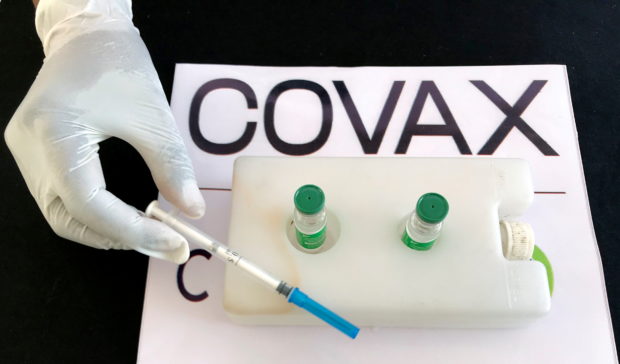WHO head denounces vaccine inequity as COVAX scheme marks first year

A nurse prepares to administer the AstraZeneca/Oxford vaccine under the COVAX scheme against the coronavirus disease (COVID-19) at the Eka Kotebe General Hospital in Addis Ababa, Ethiopia March 13, 2021. REUTERS/Tiksa Negeri
GENEVA – Coronavirus vaccines remain out of reach in the poorest countries, the head of the World Health Organization (WHO) said in a report on Friday, marking the first anniversary of the COVAX dose-sharing facility.
“Nearly 900 million vaccine doses have been administered globally, but over 81% have gone to high- or upper middle-income countries, while low-income countries have received just 0.3%,” WHO director-general Tedros Adhanom Ghebreyesus said about the ACT (Access to COVID-19 Tools) Accelerator set up a year ago.
He later told a briefing he was concerned about the rising caseload in India.
India reported the world’s highest daily tally of coronavirus infections for a second day on Friday, surpassing 330,000 new cases, as it struggles with a health system overwhelmed by patients and plagued by accidents and lack of medical oxygen.
“The situation in India is a devastating reminder of what the virus can do,” he told a virtual briefing.
Article continues after this advertisementTedros has repeatedly denounced inequities in vaccine distribution and urged wealthier countries to share excess doses to help inoculate health workers in low-income countries. More than 3 million people have died in the pandemic.
Article continues after this advertisement“Continued lack of financial support for the ACT Accelerator poses a major obstacle for its ability to deliver at scale” Dag Ulstein, Norwegian minister of international development, told the same briefing.
COVAX, which has shipped 40.5 million doses to 118 countries so far, aims to secure 2 billion doses by the end of 2021.
On Thursday, COVAX, co-run by the Gavi Vaccine Alliance and WHO, said it was seeking to bolster its supplies of vaccines for poor countries from new manufacturers as it aims to mitigate supply problems of the AstraZeneca vaccine from India, its main shot so far.
“Low-income countries test less than 5% as much as high-income countries, and the majority of countries still have trouble accessing sufficient oxygen and dexamethasone,” Tedros said. He was referring to an inexpensive steroid found to help patients suffering severe COVID-19, the only WHO-approved treatment for the disease.
gsg
For more news about the novel coronavirus click here.
What you need to know about Coronavirus.
For more information on COVID-19, call the DOH Hotline: (02) 86517800 local 1149/1150.
The Inquirer Foundation supports our healthcare frontliners and is still accepting cash donations to be deposited at Banco de Oro (BDO) current account #007960018860 or donate through PayMaya using this link.